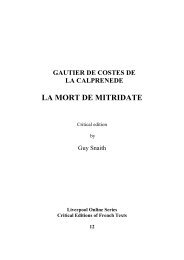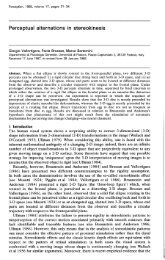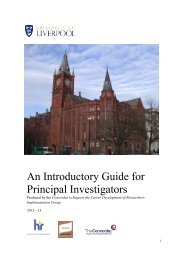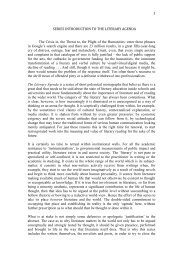LA MORT DE MITRIDATE - University of Liverpool
LA MORT DE MITRIDATE - University of Liverpool
LA MORT DE MITRIDATE - University of Liverpool
You also want an ePaper? Increase the reach of your titles
YUMPU automatically turns print PDFs into web optimized ePapers that Google loves.
La Mort de Mitridate<br />
past. It is a precarious future, but for Pharnace it is a way <strong>of</strong> surviving for the<br />
moment. Both Bérénice and Mitridate realize that it is a friendship in name only.<br />
In her interview Bérénice calls her husband ‘le serf des Romains’ (III.3.820), a<br />
word which recurs at the end <strong>of</strong> the play as Émile takes command. Pharnace, on<br />
his knees before the corpses <strong>of</strong> his family, asks: ‘Pompée à son depart vous a-il<br />
ordonné, / De me traiter en serf, lui qui m’a couronné ?’ (V.4.1753-54). Mitridate<br />
is dead, Rome has what it wants, Pharnace can revert from an ami d’éternelle<br />
durée to the status <strong>of</strong> a serf couronné. And the first cogs in the machinery <strong>of</strong><br />
Mitridate’s prophecy: ‘Tu seras ruiné par cette Republique’ (IV.3.1298) begin to<br />
engage, for ‘le châtiment du révolté’ is also an important aspect <strong>of</strong> the baroque<br />
imaginary. 108<br />
Mitridate prefers not to survive under such a system. Indeed he knows what<br />
awaits him, should the Romans get hold <strong>of</strong> him. His exhortation to Pharnace to be<br />
his own man: ‘Puis que ta liberté depend de ton vouloir’ (IV.3.1148), reveals the<br />
importance <strong>of</strong> the individual will to Mitridate. His decision to die by his own hand<br />
means that he carries through to the end his philosophy <strong>of</strong> life and that he cheats<br />
Rome one last time, for they will not have the pleasure <strong>of</strong> seeing him in one <strong>of</strong><br />
their triumphs. He declares: ‘Rome à qui je ravis un superbe ornement, / Ne me<br />
verra vaincu que par moy seulement….’ (V.3.1661-62). His ultimate cheat, that<br />
through his death Pharnace’s claim to the throne becomes legitimate, means one<br />
last victory for the old order <strong>of</strong> things, when crowns passed through birth and<br />
inheritance rather than through appointment from Rome. True to his principles,<br />
Mitridate succeeds in turning utter defeat into victory. Like Souiller’s baroque<br />
father, Mitridate is both ‘humilié et triomphant’ (p. 85).<br />
Although La Mort de Mitridate should not be read allegorically, the conflict<br />
between a philosophy <strong>of</strong> the individual and the power <strong>of</strong> the state which La<br />
Calprenède dramatizes is one which echoes the political tensions <strong>of</strong> the 1630s.<br />
The play falls into Rohou’s category <strong>of</strong> ‘tragédie d’opposition’: a ‘tragédie<br />
anticentraliste’ which is against ‘la construction d’un ordre nouveau’ (pp. 147-48).<br />
The irony, <strong>of</strong> course, is that to do so, its author enthusiastically adopts the<br />
dramaturgy <strong>of</strong> the new order: rational and disciplined.<br />
‘Ce devoir du sang’: Family Tragedy<br />
From his first play La Calprenède realized the dramatic value to be had from close<br />
ties <strong>of</strong> birth or affection between characters. The choice La Calprenède made to<br />
expand the number <strong>of</strong> women from the two daughters mentioned in Appian and<br />
the fact that five members <strong>of</strong> the royal family are dead by the end means that the<br />
play can inevitably be viewed as the tragedy <strong>of</strong> a family. The pleasure afforded an<br />
audience by such situations is noted by Corneille, commenting on Aristotle’s<br />
recommendation:<br />
108 Souiller, p. 91.<br />
38

















